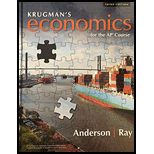
The correct option regarding the function of central banks.
Explanation of Solution
A financial institution with exclusive authority over the creation and transmission of currency and loans for a country or a collection of countries is known as the central bank. In modern governments, the central bank is typically in charge of
The very nature of central banks makes them non-market and even anti-competitive organizations. Despite some being nationalized, many central banks are not part of the government and are, therefore, frequently hailed as being politically impartial. A central bank's rights are still created and safeguarded by law even though it is not the government's property.
The crucial characteristic that sets a central bank apart from other banks is its statutory
Chapter 26 Solutions
Krugman's Economics For The Ap® Course